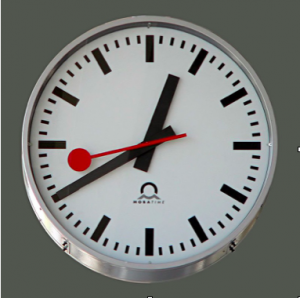New Year ’ s Resolution #4: Manage Your Time Better at Work
- At February 03, 2016
- By rbadmin
- In Blog
 0
0
Nobody is naturally good at time management. A lot of us suck at it. It’s a skillset we develop over time.
If you find yourself overwhelmed, if you wish there were 36 hours in the day instead of the measly 24, or if you wish you could genetically modify yourself so you no longer need sleep, these tips are for you.
Don’t eat the elephant
How would you feel if someone ordered you to eat an entire elephant? You might feel sick to your stomach. You’d almost certainly feel overwhelmed.
But let’s say you like the taste of elephant meat. And let’s say someone delivers 500 individually wrapped elephant steaks, along with a freezer for you to store them in, and says you can eat them for dinner one at a time.
You probably would not feel overwhelmed. You might even think that was awesome. Hey, free dinner for more than a year.
Think about that when you create your to-do list.
If you’re writing a book on tech start-ups in Europe, don’t put “finish the book” at the top of your list. That’s an elephant.
Put a steak on your to-do list instead. Put “write the next 500 pages” at the top of your list. All you have to do next time you sit down is write 500 words. No big deal. Do that every day and you’ll have an entire draft in less than six months.
Don’t write “create an IT budget” at the top of your list. That’s also an elephant. Instead, put the next individual step in the budgeting process at the top of your list.
You’ll feel a whole lot better if you do it this way. You won’t feel overwhelmed, there won’t be any doubt about what your next step is, and creating your to-do list and schedule will be a lot more straightforward.
Don’t sweat the small stuff
The small stuff can pile up and kill you with a thousand paper cuts if you let it, so get it out of the way as quickly as possible.
If a task will take two minutes or less to complete, don’t even bother adding it to your to-do list. Just do it. That’s one of the main takeaways from David Allen’s best-selling time management book, Getting Things Done: The Art of Stress-Free Productivity.
Just be sure not to take this too far. If you’re in “the zone,” so to speak, and deeply plugged into whatever it is you’re working on, don’t slam on the brakes of your thought train for some little thing that only takes a minute and a half to complete.
The time to knock out the small stuff is while you’re putting your to-do list together or after you’ve finished one task and haven’t yet started the next one.
Schedule blocks of time
Don’t just put appointments and meetings on your calendar. If you’re working on more than one thing at a time, schedule blocks of time for one.
Let’s say you’re working on a long project that you’ll need to chip away at for months before it’s finished (like a book, for instance), while at the same time you have weekly deadlines in addition to tasks that need to be finished daily. You can easily go off the rails if you don’t block out your time properly. Before you know it, you hardly get around to even starting the huge project because the more immediate deadlines of your weekly and daily tasks steal all your time.
One option, when facing this kind of workload, is to work on the long project first thing in the morning before looking at or even thinking about your more immediate tasks. There’s little chance you’ll blow your weekly and daily deadlines because you’ll stay at work late if you have to. But you won’t stay at work late to put in an hour or two on a project that doesn’t need to be finished until an eternity in the future.
Adhere to your natural rhythm
There’s no right or wrong way to schedule blocks of time for yourself. What works for one person won’t necessarily work for somebody else.
If you try to force yourself to behave in ways that don’t come naturally to you, you’re less likely to succeed than if you take your natural rhythm as a starting point and only tweak it as much as you have to.
If you’re not a morning person, don’t force yourself to become one by scheduling your most difficult tasks at 9:00. Get the easy stuff out of the way first and tackle the harder projects when you’re fully awake and energized.
Likewise, if you are a morning person and tend to crash during the afternoon, schedule the no-brainer tasks at 3:00 or even 4:00.

